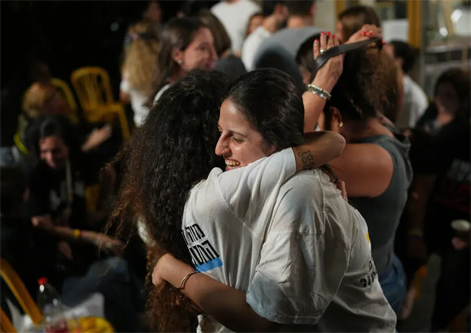|
The
route
used by
Palestinians
in the
Gaza
Strip to
flee the
most
intense
areas of
the war,
on
Monday.Credit...Saher
Alghorra
for The
New York
Times |
|
|
|
|
|
 |
 |
 |
|
|
|
|
|
|
 |
|
|
Relatives
and
supporters
of
Israeli
hostages
held by
Hamas in
Gaza
celebrating
after
the
announcement
that
Israel
and
Hamas
have
agreed
to the
first
phase of
a peace
plan, in
Tel
Aviv, on
Thursday.Credit...Emilio
Morenatti/Associated
Press |
| |
Breakthrough
in Gaza:
Parties
Agree to
Phase
One
Despite
Lingering
Concerns
Patricia
Romero -
International
Tell Us
USA News
Network
In a
major
breakthrough
announced
just
hours
ago,
Israel
and
Hamas
have
agreed
to the
first
phase of
a
comprehensive
peace
deal
aimed at
ending
the
devastating
two-year
war in
Gaza.
President
Donald
Trump
announced
the
agreement
on
social
media,
with
leaders
from
both
sides
confirming
their
acceptance
of the
initial
terms.
The
agreement
marks a
significant
turning
point in
a
conflict
that has
ravaged
the Gaza
Strip
since
Hamas
launched
its
October
7, 2023
attack
on
Israel.
Over the
past two
years,
Gaza has
been
almost
entirely
destroyed,
with
more
than
67,000
Palestinians
killed
in the
fighting.
The
breakthrough
comes
after
intensive
negotiations
held in
Egypt
over
recent
days,
with
Qatar
playing
a
crucial
mediating
role
throughout
the
process.
Under
the
first
phase of
the
deal,
Israel
will
begin a
partial
withdrawal
of its
troops
from
Gaza
while
Hamas
releases
the
remaining
hostages
held
since
the
initial
attack.
The
White
House
has
indicated
it
expects
hostages
to begin
returning
home as
early as
Monday.
According
to
Israeli
estimates,
48
hostages
remain
in Gaza,
of which
approximately
20 are
believed
to still
be
alive.
The deal
calls
for
Hamas to
release
nearly
50
hostages,
both
living
and
deceased,
while
Israel
will
free
nearly
2,000
Palestinian
prisoners
and
detainees.
The
exchange
formula
outlined
in the
plan
stipulates
that
Israel
will
release
between
30 to 50
Palestinian
prisoners
for
every
Israeli
hostage
returned,
with
priority
given to
women
and
children
on both
sides.
Trump
declared
that the
agreement
means
all
hostages
will be
released
very
soon,
and that
Israel
will
withdraw
troops
to an
agreed-upon
line as
the
first
steps
toward
what he
called
"a
strong,
durable,
and
everlasting
peace."
He
emphasized
that all
parties
will be
treated
fairly
in the
process.
Israeli
Prime
Minister
Benjamin
Netanyahu
has
publicly
backed
the
proposal
and
extended
an
invitation
for
Trump to
address
the
Israeli
parliament,
the
Knesset,
though
no date
has been
set.
The
peace
plan is
built on
Trump's
comprehensive
20-point
proposal
unveiled
just
over a
week ago
at the
White
House
during
Netanyahu's
visit.
The
ambitious
framework
calls
for
nothing
less
than a
complete
transformation
of
Gaza's
governance
and
future.
Hamas,
which
has
ruled
Gaza for
nearly
two
decades,
would
step
aside
under
the
agreement.
In its
place, a
transitional
governing
committee
would be
established,
composed
of
qualified
Palestinians
and
international
experts
who
would
handle
day-to-day
administrative
tasks
and
local
governance.
Overseeing
this
transitional
committee
would be
an
unprecedented
international
body
called
the
"Board
of
Peace,"
to be
chaired
by
President
Trump
himself.
Former
British
Prime
Minister
Tony
Blair
has been
named as
another
member
of this
supervisory
board,
with
additional
heads of
state
expected
to be
announced.
This
board
would
set the
framework
for
Gaza's
reconstruction
and
manage
funding
for
redevelopment
efforts
until
the
Palestinian
Authority
completes
a
mandated
reform
program.
The plan
envisions
large-scale
reconstruction
of
Gaza's
shattered
infrastructure,
the
deployment
of an
international
stabilization
force to
provide
security,
and the
complete
demilitarization
of the
territory.
Humanitarian
aid
would be
allowed
to flow
into
Gaza in
sufficient
quantities
during
the
initial
phase.
Critically,
the
proposal
states
that
Gaza
residents
would
not be
forced
to leave
their
homes as
part of
the
agreement.
Despite
the
optimism
surrounding
today's
announcement,
significant
challenges
remain.
Hamas
has
expressed
concerns
about
guarantees
that
Israel
will not
resume
military
operations
once the
hostages
are
freed,
highlighting
the deep
mistrust
between
the
warring
parties.
The
success
of
subsequent
phases
will
depend
on both
sides
honoring
their
commitments
and the
international
community's
ability
to
maintain
momentum
toward a
lasting
peace.
Qatar,
serving
as
mediator,
indicated
that
more
specific
details
of the
implementation
would be
announced
at a
later
date.
The
agreement
represents
the most
substantial
progress
toward
ending
the
conflict
since it
began,
offering
a
glimmer
of hope
to both
Israelis
desperate
for
their
loved
ones'
return
and
Palestinians
seeking
an end
to the
destruction.
However,
the road
ahead
remains
fraught
with
obstacles,
and
whether
this
first
phase
can lead
to a
permanent
resolution
remains
to be
seen.
|
|
|
|
|
|
|
|
|